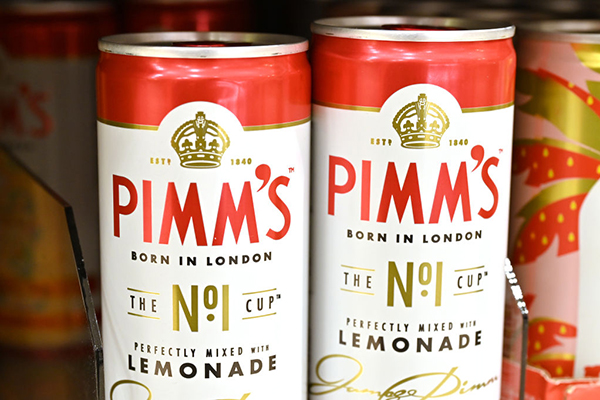The recovery outlook for Diageo shares in 2025
A terrible couple of years could soon be over if you believe this star fund manager, but analysts aren’t so sure. Here’s the latest City opinion on the struggling drinks giant.
4th December 2024 13:18
by Graeme Evans from interactive investor

The view for Diageo (LSE:DGE) in the following 12 months today divided opinion after fund manager Nick Train reiterated his support but a City bank said shares are still among its least preferred.
Deutsche Bank highlighted the three Ts of Tariffs, Temperance and Trade Down as reasons for its continued caution towards European distillers and brewers such as Diageo.
- Invest with ii: Top UK Shares | Share Tips & Ideas | Open a Trading Account
The FTSE 100-listed company’s shares are down 17% this year and remain near a multi-year low at 2,337p as the Johnnie Walker, Guinness, Pimm’s and Smirnoff maker struggles to rebuild confidence after 2023’s warning over weaker trading in Latin America and the Caribbean.
Its stalled recovery is in line with the wider industry as earnings have been squeezed by pressure on emerging markets as well as wider macroeconomic uncertainty.
- Terry Smith vs Nick Train: who is right on Diageo?
- Share Sleuth: tweaks to two shares I’ve held for over a decade
Portfolio manager Train told investors in today’s annual report of Finsbury Growth & Income Ord (LSE:FGT) Trust that he has “maintained or even increased exposure” during periods of share price weakness for world-class companies such as Diageo and Unilever (LSE:ULVR).
He published a chart showing how the pair not only outperformed the UK stock market over the last nearly quarter of a century, but also the S&P 500 index. The run comes despite Diageo being down 2% and Unilever up only 1% between the year ended September 2020 and 2024.
Train believes the headwinds experienced by Diageo in 2024 are predominantly cyclical and that it is better to focus on the company’s structural advantages.
Scotch, Irish Stout and Tequila are Diageo’s three biggest categories where the company has world-class brands, presenting a growth opportunity not available to its competitors.
Train added: “We also believe the long-term propensity for individuals to drink less alcohol, but to drink higher-quality alcohol is likely to continue and is advantageous for Diageo, as the world’s biggest premium alcoholic beverage company.”
- Stockwatch: time to buy this ex-FTSE 100 fallen star?
- ii view: Diageo – more than just a bump in the road?
His comments came as Finsbury reported net asset value (NAV) per share growth of 8.2%, below its benchmark’s 13.4% after strong performances by Experian (LSE:EXPN), London Stock Exchange Group (LSE:LSEG) and RELX (LSE:REL) were offset by Burberry Group (LSE:BRBY), Diageo and Schroders (LSE:SDR).
The share price return over the same period was 3.4%, widening the discount to NAV. At today’s level of 891p, Train himself bought Finsbury shares worth £222,750 in a move increasing his stake to 3.5%.
Deutsche Bank sees little reason for optimism that 2025 will be any better for Diageo after it cut its price target from 2,000p to 1,970p in a note on the sector published today.
The bank also lowered Heineken NV (EURONEXT:HEIA) and Davide Campari-Milano NV Az nom Post Frazionamento (MTA:CPR) to Hold from Buy and Remy Cointreau (EURONEXT:RCO) to Sell.
It said: “2024 was a tough year for European Beverages and with consensus estimates too optimistic for 2025, we believe stock selectivity will be key. We remain cautious on Spirits and become more selective within Beer, while continuing to like Soft Drinks.”
The bank’s top picks within European beverages include Coca-Cola HBC AG (LSE:CCH) and Britvic suitor Carlsberg as they offer relative insulation from tariffs and trading down.
The report warns that the downside risk posed by the potential implementation of tariffs into the US and China is far from being reflected in consensus estimates or company valuations.
- Sign up to our free newsletter for investment ideas, latest news and award-winning analysis
- eyeQ: a bullish signal for two undervalued stocks
It says that Remy, Diageo, Campari and Pernod Ricard SA (EURONEXT:RI) have the highest risk from US tariffs, while Remy and Pernod have the highest risk from tariffs into China. Emerging market currency risk is another source of potential volatility.
The report adds that surveys show respondents in the US, the UK, France, Germany, Italy, Spain and Brazil are consuming less alcohol now than they did last year.
The bank said it is tempting to argue that the sector is attractively valued with nine out of 10 companies in European beverages at a discount to their five-year average multiples.
However, it points out that only four are at a discount to their average during the 2000-05 period and that the sector appears expensive versus bond yields.
The bank said: “Taken together, we believe the European Beverages is broadly fairly valued. We, therefore, believe earnings growth and/or positive estimate revisions are, therefore, needed for share price appreciation.”
These articles are provided for information purposes only. Occasionally, an opinion about whether to buy or sell a specific investment may be provided by third parties. The content is not intended to be a personal recommendation to buy or sell any financial instrument or product, or to adopt any investment strategy as it is not provided based on an assessment of your investing knowledge and experience, your financial situation or your investment objectives. The value of your investments, and the income derived from them, may go down as well as up. You may not get back all the money that you invest. The investments referred to in this article may not be suitable for all investors, and if in doubt, an investor should seek advice from a qualified investment adviser.
Full performance can be found on the company or index summary page on the interactive investor website. Simply click on the company's or index name highlighted in the article.